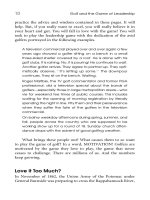Universal basic income and the reshaping of democracy towards a citizens stipend in a new political order
Bạn đang xem bản rút gọn của tài liệu. Xem và tải ngay bản đầy đủ của tài liệu tại đây (534.13 KB, 60 trang )
SpringerBriefsinPoliticalScience
Moreinformationaboutthisseriesathttp://www.springer.com/series/8871
BurkhardWehner
UniversalBasicIncomeandtheReshapingof
Democracy
TowardsaCitizens’StipendinaNewPoliticalOrder
BurkhardWehner
Horst,Germany
ISSN2191-5466
e-ISSN2191-5474
SpringerBriefsinPoliticalScience
ISBN978-3-030-05827-2
e-ISBN978-3-030-05828-9
/>LibraryofCongressControlNumber:2018964044
©TheAuthor(s),underexclusivelicensetoSpringerNatureSwitzerlandAG2019
Thisworkissubjecttocopyright.AllrightsarereservedbythePublisher,whetherthewhole
orpartofthematerialisconcerned,specificallytherightsoftranslation,reprinting,reuseof
illustrations,recitation,broadcasting,reproductiononmicrofilmsorinanyotherphysical
way,andtransmissionorinformationstorageandretrieval,electronicadaptation,computer
software,orbysimilarordissimilarmethodologynowknownorhereafterdeveloped.
Theuseofgeneraldescriptivenames,registerednames,trademarks,servicemarks,etc.in
thispublicationdoesnotimply,evenintheabsenceofaspecificstatement,thatsuchnames
areexemptfromtherelevantprotectivelawsandregulationsandthereforefreeforgeneral
use.
Thepublisher,theauthors,andtheeditorsaresafetoassumethattheadviceandinformation
inthisbookarebelievedtobetrueandaccurateatthedateofpublication.Neitherthe
publishernortheauthorsortheeditorsgiveawarranty,expressorimplied,withrespectto
thematerialcontainedhereinorforanyerrorsoromissionsthatmayhavebeenmade.The
publisherremainsneutralwithregardtojurisdictionalclaimsinpublishedmapsand
institutionalaffiliations.
ThisSpringerimprintispublishedbytheregisteredcompanySpringerNatureSwitzerlandAG
Theregisteredcompanyaddressis:Gewerbestrasse11,6330Cham,Switzerland
Contents
1Introduction
2BasicIncome—AProjectforGenerations
2.1UnconditionalBasicIncome—AConsensus-BuildingTerm?
2.2TheTransitiontotheBasicIncomeSystem—AnImpossibleTask?
References
3ALong-TermVision
3.1MaximalMarketTransparency
3.2MaximalTransparencyinRedistribution
3.3BasicIncomeandSocialSecurity
3.4BasicIncome,MinimumWageandFullEmploymentGuarantee
3.5Optimization,NotMaximization
References
4BasicIncomeinOtherPolicyAreas
4.1BasicIncomeandBusinessCyclePolicy
4.2BasicIncomeandDemographicPolicy
4.3BasicIncomeforNationsinNeed
References
5CommonObjectionstoBasicIncome
5.1TaxBurdenandWorkIncentives
5.2FurtherObjections
References
6TheRoleofPilotStudies
6.1ExperimentstoDate
6.2TheLogicofBasicIncomeStudies
6.3TheCaseforNationwideExperiments
6.4CandidatesforNationwideExperiments
6.5PrinciplesofSponsoring
6.6PotentialSponsors
6.7EpistemicObjectives
References
7BasicIncome,DemographicStructureandtheSizeoftheState
References
8BasicIncomeandtheReshapingofDemocracy
8.1IntellectualOverburdeningofPolicymakers
8.2BasicIncomeStates—InvoluntaryAssociations?
8.3IntellectualOverburdeningofCitizens
References
9AProjectforthe22ndCentury?
9.1TwoBasicErrors
9.2FormationofConsciousness
9.3ThePoliticalDetourasaShortcut
9.4TheFutureofBasicIncomeActivism
©TheAuthor(s),underexclusivelicensetoSpringerNatureSwitzerlandAG2019
BurkhardWehner,UniversalBasicIncomeandtheReshapingofDemocracy,SpringerBriefsinPoliticalScience
/>
1.Introduction
BurkhardWehner1
(1) Horst,Germany
BurkhardWehner
Email:
Thediscussionofuniversalbasicincomehascometoadeadlock.Sofar,thequestions
whether,when,where,andhowauniversalbasicincomecouldeventuallybeputintopolitical
practicehaveplayedaminorroleinthisdiscussion.However,thesequestionsbelongnotat
theend,butatthebeginningofthedebate.
Thislineofinquirybringsthepoliticallogicofbasicincomeintofocus.Thislogiccarries
highlycontroversialpoliticalandscientificimplications.Itrevealsthatthepoliticsofbasic
incomemustbediscussedinamuchwidercontextandoveramuchlongertimehorizonthan
hithertodone.
Inthelightofthislogic,theinstitutionsandrulesofconventionaldemocracyareshownto
beinsuperablebarrierstouniversalbasicincome—barriersnotonlytoconcretepolitical
implementation,butalsotolarge-scaleandnationwidebasicincomeexperiments.
Inthecontextofpresentdemocracies,basicincomewouldneitherfindsufficientsupport
withvoters,norcoulditbeimplementedwiththeexceptionalforesightandcompetence
necessaryforsuchaproject.
Thisbookoutlinesalternativepoliticalinstitutions,rules,andstrategiesthatcould
eventuallymakeuniversalbasicincomepoliticallyviable.
©TheAuthor(s),underexclusivelicensetoSpringerNatureSwitzerlandAG2019
BurkhardWehner,UniversalBasicIncomeandtheReshapingofDemocracy,SpringerBriefsinPoliticalScience
/>
2.BasicIncome—AProjectforGenerations
BurkhardWehner1
(1) Horst,Germany
BurkhardWehner
Email:
ThisbookisalargelyextendedversionandinpartatranslationofWehner(2018).It
summarizesargumentsfromformerpublicationsoftheauthor.Foranoverviewseehttp://
www.reformforum-neopolis.de/reformforum/sozialstaat.htmlorhttp://www.reformforumneopolis.de/reformforum/gesamtkatalog.html.
2.1 UnconditionalBasicIncome—AConsensus-Building
Term?
Unconditionalbasicincomeisdifficulttodiscussfreefromemotionandideology.
Controversiesinthisfieldresultlessfromdifferencesineconomiccalculationsthanfrom
politicalandideologicalprejudice.Thediscussionthereforecannotbeobjectiveandsober
unlessthepoliticallogicofunconditionalbasicincomeisfullyrevealed.Thislogicisthekey
tothequestionofwhether,how,where,andwhenanunconditionalbasicincomecouldbe
implemented.
Fromaneconomicpointofviewatleastonethingshouldbeuncontested:an
unconditionalbasicincomeisaffordable.Butthisisofcourseatrivialfact.Therewillbeno
denyingthatthereisanamountgreaterthanzerothatthestatecanregularlypayitscitizens
asbasicincome.Thedisputebecomesacute,however,ashigheramountsofbasicincomeare
discussed.Then—dependingonideologicaldisposition—thisbasicincomemayberegarded
asanoutgrowthofeconomicignorance,asaleftistutopia,orasafigleafofaneo-liberal
system.ThefactthatunconditionalbasicincomehasbeenincorporatedinEuropeanparty
programsandisincreasinglydiscussedinprintmediaandtalkshowsmakesthedebateeven
morediffuse.Ideologicalbiaseswillnotbeovercomeevenifthesocialandeconomic
implicationsofunconditionalbasicincomeareexaminedinevermorestate-organizedfield
trials.Suchtrialscanprovideonlyavagueindicationoftheimpactofaparticularvariantand
amountofthebasicincomeinaparticularwelfarestateandsocialenvironment.Theywillnot
andcannotreconcilecurrentconceptualcontroversiesaboutunconditionalbasicincome.
Inthepast,manyadvocatesofunconditionalbasicincomehavetakenitforgrantedthat
thisincomemustsecureasufficientlivelihoodbyitself.Thehigherthebasicincome,
however,themoredifficultitbecomestoprovethatitcouldbefinancedinawaythatis
politicallyacceptable.Mostdefendersofbasicincomedonottendtobeveryspecific
regardinghowitwouldbefinanced.Itisoftenunclearwhichtaxesandwhichtaxratesareto
beusedforfinancingandhowexistingsocialsecurityandsocialtransfersshouldbereformed
whenthebasicincomeisimplemented.Itisalsooftenleftunclearwhoshouldbeentitledto
receivebasicincome,andtherearedivergentnotionsaboutthedisbursementmode,in
particularthepossibleoffsetofthebasicincomewiththeincometax.Mostchallengingisthe
matterofdesigningaprocessoftransitionfromtheexistingsocialsecuritysystem.The
presentdebatehasfailedtomakeclearthewinnersandlosersunderanunconditionalbasic
incomeregimeandinparticularhowtheserelativeeffectsmaydevelopovertime.Suchnontransparencyinducesanxietyamongpresumedlosers,anditcanmakethemreceptiveto
populistagitationagainstbasicincomeproposals.Moreover,manyadvocatesof
unconditionalbasicincomeseekthesupportofaparticularideologicalgroupbutpresent
ideasobjectionabletoothergroups.Thistensionmayalsocontributetoageneralnegativity
towardunconditionalbasicincome.Thereby,theoverwhelmingrejectionofunconditional
basicincomeinthe2016Swissreferendumdidnotcomeasasurprise;onlyabout10%ofthe
electoratevotedinfavor.
Asclearasthisoutcomewas,itremainsunclearpreciselywhatwasrejected.Therejection
wascertainlynotaboutunconditionalbasicincomeinanyformandamount.Rather,the
electoraterejectedanorderofmagnitudeofabasicincomeinformallyrecommendedby
thosewhodesignedthereferendumproposal.
Suchablatantfailureofareferenduminevitablyaffectspublicconsciousness.Losers
includenotmerelyindividualsandorganizations,butalsotermsandconcepts.Inthiscase,a
possiblelosermaybetheterm“unconditionalbasicincome”itself.Eveniflargepartsora
majorityofcitizenssympathizewiththistermasanabstractconcept,ithasbecomeapparent
thattheoverwhelmingmajoritydistrustsitspracticability.
Undersuchcircumstances,itcouldbehelpfultoatleasttemporarilyreplacethisterm
withamoreneutralalternative.Thisreframingcouldatanyratehelpdissociatethebasic
incomeconceptfromthewidespreadassumptionthatitwouldaloneensureadecent
livelihoodpreferablyabovethelevelguaranteedbythecurrentwelfaresystem.Abasic
incomemustbynomeansreachthisleveltoinstillitsmanypositiveeffects.
Theuseofnewtermsforknownconceptscan,ofcourse,alsocreatenewconfusion.
However,thetermunconditionalbasicincomecaninthecurrentdiscussioneasilybe
replacedbyafamiliaralternativesuchas“citizens’allowance”or“citizens’stipend”.1
Suchtermsalsohaveturbulenthistories.Theyhavebeenassociatedwithprejudices,have
insomeEuropeancountriesbeeninstrumentalizedinpartypolitics,andhavebeenused
ambiguouslyinpublicdiscourse.Nevertheless,theirusedatessufficientlyfarbacktocarry
alternativeconnotations.Movingforward,thetermcitizens’stipendcanthereforebegiven
preferencetothemorefamiliartermsunconditionalanduniversalbasicincome.This
reframingmighthelptoexplorethepotentialforpoliticalconsensusonthismatterwithout
bias.Inthefollowing,basicincomeisusedonlyasamoregeneralterm,whereastheterm
citizens’stipendmostlyreferstothespecificbasicincomeschemeoutlinedinthisessay.
2.2 TheTransitiontotheBasicIncomeSystem—An
ImpossibleTask?
Unconditionalbasicincomeismostlydiscussedasifitwereanordinarypoliticalissue
comparabletosomethinglikeataxreform.Butthismissesthepoint.Thedecisionto
introduceabasicincomelackspoliticalprecedent.Itsextremelylong-termperspectivewould
markagroundbreakingprocessofchangeneverpreviouslyaccessedbyconventional
democracy.Politicalimaginationinthismatterisaccordinglypoorlydeveloped.
Indiscussingsuchaseeminglyradicalconceptasacitizens’stipend,twoaspectsmustbe
strictlyheldapart:thelong-termgoalandthetransitionalprocessesprecedingit.Acitizens’
stipendwouldbemarkedbylongrun,qualitativesocialchangedefinedbywhetherornotthe
societywillinthelongrunbemoreprosperous,dynamic,fair,free,lively,andcreative.In
contrast,atransitionprocesswouldbringtotheforefrontthequestionofinitialwinnersand
losers.Lossesandgainscanbeeconomic,butalsoideologicalandpolitical—i.e.gainsand
lossesofinterpretivesovereignty,electoralvotes,influence,andpower.Preciselythelatter
are—atleastimplicitly—themostcontroversialissuesinthecurrentpublicdebateabout
unconditionalbasicincome.Theprogram’sfiercestopponents,therefore,aretobefound,for
themostpart,wherelossofpower,prominence,significance,andimportanceismostlikelyto
besufferedduringandasaresultofasystemchange.
Incontrast,afar-sighteddiscussionaboutthecitizens’stipendpushesthearguments
beyondsuchshort-termdisputes.Prioritywouldinsteadbegiventodiscussingthelong-term
socialandpoliticalobjectivetofostertheemergenceofanewsocietalstate.
Oneofthemajorobjectivesofthecitizens’stipendsystemistomakethepoliticaldispute
overthedistributionofincomeandprosperityeasiertounderstandandlessdivisiveand
therebytofostersocialpeaceandconsent.Thatadvocatesandopponentsofunconditional
basicincomestillopposeeachotherfromseeminglyirreconcilablepositionsistherefore
evidenceofamisunderstandingandshowsthattheconceptwasintroducedintothepublic
discoursewithfalsepremises.
Onecouldarguethattheintroductionofabasicincomewouldinevitablyproducewinners
andlosers,thatthelosersmightbethemajority,andthatthereforeaharshpoliticaldebate
abouttheissueisinevitableandevennecessaryinademocracy.Citizens,stakeholders,
politicians,opinionleaders,andexpertswouldthenrightlyaskthemselveswhethertheirown
interestsandtheinterestsoftheinstitutionsandorganizationstowhichtheyfeelattached
arerespectedandwhichconvictions,whetherpolitical,ideological,scientificorothers,might
erodeinabasicincomesystem.Fromthisperspective,theintroductionofabasicincome
withbroadpoliticalconsensusisillusory,andthepoliticallogicofthebasicincomecanbe
nothingmorethanalogicofconflictofinterests.
Thisclaimwouldbeappropriateifthedecisionaboutabasicincomesystemwere
imaginedasacommoncaseofdemocraticpoliticsandtherebyasamatterofcontest
betweenpartiesandpartycoalitionsforelectoralvotes.Itwouldthenbeplausiblethat
somedayacoalitionofpartiesfavoringbasicincomewouldimpulsivelyseizeanopportunity
topassabasicincomelawwithaparliamentarymajority,howevernarrow.Butsuchalaw
couldequallyeasilybelaterabolishedunderdifferentpoliticalconditions.Consequently,
unconditionalbasicincomecouldthereafterbepoliticallydiscreditedforgenerations.
Advocatesofbasicincomewouldthereforebewelladvisedtobewareofanyshort-term
politicalsuccess.EveninSwitzerland,areferendumwinin2016wouldatbesthavebeena
Pyrrhicvictory.
Anyattempttorapidlyintroduceabasicincomewouldinevitablyresultincomplex
overlapswiththenon-transparentexistingwelfaresystem,furtherheighteningconfusion.
Thisperceivedthreattotheexistingwelfarealonecouldbesufficienttoreverseanyinitial
euphoria.Anxietiesandconcernsaboutdistributionofwealthandincomecouldbefueled
moreeasilythaneverwithpopulistandideologicalslogans.Abasicincomethatisnot
sustainedbyawideandreliablepoliticalmajorityfromtheoutsetmaythereforenotbeseen
asdependableintermsofoutlayandtaxliabilityandlevelofcomplementarysocialsecurity.
Ifnotembeddedinacoherentconceptforalong-termsystemtransition,thebasicincome
wouldmakesocialpolicyevenmorecomplicated,lesstransparent,andmoreconflict-prone
thanbefore.
Howelsethencouldthetransitionfromtheexistingsystemtoabasicincomebe
imagined?Howcoulditbekeptapartfromthetypicalpoliticalquarrelswiththeirpopulist
simplifications?Howcoulditbeexemptedfromthebanalityofcommondemocraticelection
campaignsandfromtheerraticeffectsoffrequentlychangingparliamentarymajorities?
Themostobviousand,infact,themostplausibleanswertothesequestionsis:basic
incomecannotwork,atleastnotinthedemocracywehave.Inotherwords,ourdemocracy
doesnotprovideadequateconditionsfortheintroductionofabasicincomesystem.
Skepticsofbasicincomewouldeasilyacceptthis.Theywouldarguethatthebasicincome
projectisnoreasontoquestionexistingdemocraticrulesandprocedures;thatdemocracy
shouldnotadapttoabasicincomesystem,butthewelfarestatemustadapttotheexisting
democracy;andthattheresultingrestrictionsonthedesignofthewelfarestatemust
thereforebeaccepted—thatis,ifthebasicincomeprojectisimpracticableindemocratic
politics,thisisthefaultofbasicincome,notofdemocracy.
Theemphasisonthisdirectionofcausalityisthemostconvenientreaction.Buta
completelydifferentconclusioncouldbedrawnifthequestionwere,forexample,putinthis
way:couldthepoliticalimpracticabilityofbasicincomepointtoafundamentalshortcoming
ofthepoliticalordertohandlegreatlong-termreforms?Ifthiswereso,itmustbeasked
whetherandhowthebasicincomeprojectcouldbesavedfromtheshortcomingsofthe
existingparliamentarydemocracy;whetherexistingdemocracycouldbefurtherdeveloped
sothatthebasicincomeprojectwouldatleastinthelongrunbecomepoliticallyfeasible.
Thismayatthefirstglanceseemtobeanexaggerated,overlyradicaland,therefore,
absurdquestion.Whetherandhowabsurditis,however,dependssolelyonthereformsto
whichdemocracyneedbesubjectedforthebenefitofthebasicincomeproject.
Theassumptionthataprojectsuchasthecitizens’stipendcouldactuallyoverstrain
existingdemocracydrawsuponpoliticalreality.Thenotionisillustratedbymanyabandoned,
aborted,andfailedpoliticalreformsthathaveplacedfarlesserdemandsonthefarsightedness,reason,andmoralityofpolicymakers.Sowhy,onemightask,shoulddemocratic
states,whichhavefailedonsomanylessertasks,developunprecedentedforesightand
creativepowerin,ofallthings,implementingbasicincome?Tothisthereisnoplausible
answer.
Thatexistingdemocraticprocedureswouldnotbeadequatetobasicincomeprojectscan
beinferredfromexperience,butequallyconvincingfromphilosophicalarguments.John
Rawls,inATheoryofJustice(Rawls1971),arguedthatdecisionmakersondistributional
justiceshouldbedisinterestedpersonsforwhomnothingpersonalisatstake.Thisaspectof
thedebatemayatfirstsightseempurelytheoretical,butitisacompellingargument.Rawls
suggeststhatbasicdecisionsaboutdistributionaljusticeshouldbemadeunderafictitious
temporary“veilofignorance”aboutones’personalcircumstances.Insuchafictitious
condition,currentinterestsandconflictsofinterestwouldnotaffecttheoutcomeofthe
decision-makingprocess.
Undertheveilofignorance,everyonewouldfearfindinghim-orherselfamongtheleast
advantagedofasocietyaftertheveilofignoranceislifted.Everyonewouldthereforewantto
makeprovisionsthattheleastadvantagedwillbeaswelloffaspossible.Inthistheoretical
condition,conflictsofinterestandassociatedpoliticalphenomenasuchaspartydisputes,
populistagitation,andideologicalpolemicsareofnoimportanceinsocialpolitics.Thus,a
societybasedonsolidarityratherthanonconflictmanagementwoulddowhateveritcouldto
optimizethewell-beingofitsleastadvantagedcitizens.
Inrealdemocraticdecision-makingprocesses,citizensandpoliticiansarenotinspiredby
suchphilosophicalthinking,andaccordingly,democraticpracticeisfarfromthescenario
conceivedbyRawls.Yetmorepressingisthequestionofhowpoliticalconditionscouldbe
moldedtoenablepoliticianstoconsiderRawlsiancriteriaformattersasessentialasthe
introductionofabasicincomesystem,i.e.tomakesuchdecisionsasunprejudicedand
unselfishaspossible.
Thismayseemutopianatfirstsight,butitispreciselyinthecontextofthebasicincome
issuethataviablesolutiontothisproblempresentsitself.Theinfluenceofself-intereston
eventualbasicincomelegislationcouldbeeliminatedbyaseeminglyverysimpleartifice.To
thisend,thepolicydecisioncouldrefertoabasicincomefromwhichlivinggenerationsare
excluded.Inthatcase,livinggenerationswouldnotdecideonabasicincomeforthemselves,
butfortheirdescendants.2Inthisscheme,nolivingcitizenorpoliticianwouldhavecauseto
beanxiousaboutmaterialorotherpersonaldisadvantagesresultingfromtheintroductionof
abasicincomesystem.
Suchadecision-makingschemewouldapplyifadecisionweretobemadeona
constitutionalamendmentstipulatingthefollowinginTable2.1.
Table2.1 Constitutionalamendmentforacitizens’stipend
Abasicincomesystemistobeintroduced
Allcitizensofallfuturebirthyearswillbelifelongrecipientsofbasicincome
Claimsofformerlyborncitizenstotheexistingsocialpolicysystemwillremainunaffectedbythesystemchange
Furtherdetailsaretoberegulatedbylegislation
Suchadecision-makingsituationwouldatleastbeclosetotheidealofthephilosophical
thoughtexperiment.Nolivingcitizen—andthusnopartyinvolvedinthepoliticaldecisionmaking—wouldbenegativelyaffectedbythesystemchangeortransitionprocess.Ifcitizens
andpolicymakersshowedsomeempathicinterestinthewell-beingofthenext-born,a
decisionintheRawlsianspiritwouldensueandtheamendmentwouldbepassed.
Withthisdecision,generationstocomewouldgrowintosuchacitizens’stipendsystem
asmatterofcourse,andthepreviousgenerationswouldremainentitledtothesamesocial
benefitsandburdensasintheoldsystem.Inthetransitionalperiod,therefore,oldandnew
welfare-stateruleswouldstandsidebyside,oneforthecitizensofyoungerbirthcohortsand
theotherforthecitizensoftheformer.Thelivingaswellasthesucceedinggenerations,the
oldandthenewcitizens,couldlookforwardtothetransitionperiodequallyatease.The
participantsoftheoldsystemwouldgraduallyvanish,andthissystemwouldthusdisappear
graduallyandwithoutcauseforconflict.Inthisway,oppositiontotheintroductionofbasic
incomewouldbereducedtoaminimum,andaccordinglythechancesforpolitical
implementationwouldbemaximized.
Evenwithsuchadelayedsystemchange,therewouldofcoursebeoverlapsbetweenthe
oldandthenewwelfarerules.Forexample,ifbasicincomeweretobeimmediatelyeffective
forallnewbornchildren,thenformersocialtransferssuchaschildren’sallowancesandothers
wouldimmediatelycease.Inthatcase,personalinterestswouldbeatstakeatleastforliving
prospectiveparents,whowouldthennotbefullyimpartialinfaceofthesystemchange.
Thisriskcouldbemitigatedifthebenefitstowhichparentsareentitledundertheold
ruleswerecontinuedandthebasicincomeforthenewbornwereaccordinglysuspendedfora
periodoftwoorthreedecades.Immediatelyafterthatperiodallcitizensbornintheyears
aftertheresolutiononthecitizens’stipendsystemwouldthensimultaneouslybecomebasic
incomerecipients.
Inthecontextoftraditionaldemocracyitmaytakeanextraordinaryefforttoengagein
long-termpoliticalthinkingthatreferstosuchdistantperiods.Evencommittedadvocatesof
basicincomemaynoteasilycometotermswiththeprospectofsuchalonglead-timefor
theirproject.Butanyvalidobjectionstotheapproachoutlinedherewouldalsohavetobe
basedonconcretelong-termtransformationscenariosthatcouldopenlong-termprospects
forsustainablepoliticalmajorities.
Ifabasicincomesystemwereintroducedasacitizens’stipendsystemintheprocedure
outlinedhere,itwouldonlybefullyimplementedafterthedeathofthelastcitizenlivingatits
start—perhapsacentury.Inaddition,weshouldallowhalfacenturyofpoliticalleadtimefor
thesystemtobeagreedupon.Therefore,thecompleteprocessofsystemchangewouldtake
atleastacenturyandahalf.Thisdelaymaysoundsobering,butintheabsenceofrealistic
alternativesonecanonlyengageinahopefulstruggleforsuchalong-termsystemtransition
orinahopelesseffortforafasterone.
Evenwithsuchanapproach,thetransitionwouldrequireanextremedegreeofpolitical
farsightedness.Butthisrequirementisofcoursenolongerasingularfeatureinpolitics.
Likewiseinotherpoliticalareas,increasinglylong-termdecisionshavetobemadewhich
haveseriousorevenirreversibleeffectsonthelivingconditionsoffuturegenerations.
Examplesincludeclimatepolicy,populationpolicy,migrationpolicy,resourcepolicy,and
peacepolicy.
Theissueofpoliticalcompetencewouldbelessconcerningforbasicincomeifthe
achievementsofdemocraticpolicyintheseareasweresatisfactory.Theopposite,however,is
true,asclimateandenergypolicyandalonglistofmistaken,delayed,neglected,andfailed
reformsinotherpolicyareashaveillustrated.Theseexamplesalonesuggestthat
conventionaldemocraticpoliticsisnotuptothetaskofsuccessfullyintroducingabasic
incomesystem.Thistaskwouldputanadditionalhighlycomplexburdenondemocratic
policymakers,parties,parliaments,andgovernments,andpredictablystrainthemfarbeyond
capacity.Citizensshouldthereforebewareofhopingforthecompetentimplementationofa
basicincomeschemebyconventionaldemocraticgovernments.Evenpoliticiansacutely
urgedtotakeonabasicincomeprojectmighthavepresentimentsofanintellectual
insufficiency,andtheymightthereforetrytofendoffsuchimpositionbydeliberatepassivity.
Passivitywouldbethefavoredpoliticalattitudeforyetanotherreason.Inthecaseofa
systemchangepostponedsofarintothefuture,personalinterestswouldbewidely
eliminated,andthusadecisionforabasicincomesystemwouldbepurelyamatterofreason.
Forsuchdecisionsoutsidetherealmofpersonalinterest,commitmentandenthusiasmare
difficulttoinspire,andthereforetheissuewouldlikelyencounterwidespreadpolitical
indifference.Thesemotivationsholdtrueforcitizens,andinconsequencealsoapplyto
politicians.Thelesspersonallycommittedcitizensaretoapoliticalproject,thefewerbenefits
partiesandpoliticianscanexpectintermsofvotes,prestige,influence,andpower.Thus,as
strongasthetheoreticalargumentforadecision-makingschemeasoutlinedabovemaybe,
thisschememightnotbecapableofcreatingthenecessarypoliticalmomentumin
conventionaldemocraticprocesses.
Conventionaldebatesaboutdemocracyprovidenoanswertothisdilemma.These
debatesarelargelyconcernedwiththequestionwhethertheproceduresofrepresentative
democracyyieldsufficientlyhighqualitypolicyoutcomesorwhethertheoutcomescouldbe
improvedbyproceduresofdirectdemocracy.
Thisdebate,however,hasnorelevancetothequestionofhowtodecideonthe
introductionofabasicincomesystemforfuturegenerations.Nopoliticianandnopolitical
partycouldclaimtohaveamandatebythosewhowillbeaffectedbysuchadecision.
Correspondingly,nolivingcitizenandconsequentlynovotercouldclaimthathisinterestsare
atstake.Whichpersonsorinstitutionscouldlegitimatelydecideonabasicincomeforfuture
generationsisaquestionthatmust,therefore,beansweredbeyondtheboundariesofcurrent
discourseaboutdemocracy.
References
RawlsJ(1971)Atheoryofjustice.HarvardUniversityPress,Cambridge
WehnerB(1990)DerlangeAbschiedvomSozialismus(Thelongfarewelltosocialism).AntonHain,Frankfurta.M.
WehnerB(1992)DerNeueSozialstaat:Vollbeschäftigung,EinkommensgerechtigkeitundStaatsentschuldung(Thenewsocial
state:fullemployment,fairincomedistributionandtheredemptionofpublicdebt).WestdeutscherVerlag,Opladen
[Crossref]
WehnerB(1997)DerNeueSozialstaat:EntwurfeinerneuenWirtschafts-undSozialordnung(Thenewsocialstate.Outlineofa
newsocialandpoliticalorder).WestdeutscherVerlag,Opladen
[Crossref]
WehnerB(2018)DiepolitischeLogikdesbedingungslosenGrundeinkommens:ZumBürgergeldim22.Jahrhundert(Thepolitical
logicofunconditionalbasicincome:towardsacitizens’stipendinthe22ndcentury).Springer,Wiesbaden
Footnotes
1 ThealternativeGermantermintroducedbytheauthoris“Bürgergeld”(Wehner1990).
2 ThisconceptwasproposedinWehner(1992,Chap.6.3)andWehner(1997,Chap.6.3).
©TheAuthor(s),underexclusivelicensetoSpringerNatureSwitzerlandAG2019
BurkhardWehner,UniversalBasicIncomeandtheReshapingofDemocracy,SpringerBriefsinPoliticalScience
/>
3.ALong-TermVision
BurkhardWehner1
(1) Horst,Germany
BurkhardWehner
Email:
3.1 MaximalMarketTransparency
Thebasicincomesystemisadistantgoal,andallcurrentdiscussionsofdesign,financing,
complementarysocialinsurance,andtheadequacyofestablisheddemocraticdecisionmakingproceduresareatanearlystage.Creatingthenecessaryawarenesswilllargelybea
projectforfuturegenerations.Inordertodecidewhethersuchasystemisreallyworthalongtermcommitmentonemust,however,haveaconcretevisioninmind,andthisvisionshould
makeitasobviousaspossiblethatunconditionalbasicincomewouldactuallyimprovethe
qualityofthewelfarestate.
Thatcitizens’stipendsystemsshouldbeimplementedonlyforcitizensoffuturebirth
cohortsisafirstimportantconcretion.Thisseparationkeepscitizens’stipendprojectsaway
fromdailypoliticsandpartydisputes,anditgreatlyfacilitatesarationaldiscourse.Butthis
alone,ofcourse,doesnotgiverisetoalong-termvision.Whetheracitizens’stipendsystem
willbepoliticallyandmorallyrewardingmustbeassessedfrommoredetailedspecifications
—fromspecificationsthatshowhowfair,howliberal,howmotivating,andhowimportantfor
socialpeaceandconsensusbuildingthesystemwouldbeinpractice.
Suchfurtherspecifications,however,neednotandshouldnotmakedeterminationson
theamountofbasicincome.Ifcombinedwithasocialsecuritysystemasproposedhere,a
futurecitizens’stipendwouldhaveapositiveimpactonsocietyevenifitfellsignificantly
shortofcurrentlyprevailingexpectations.Demandsregardingtheamountofbasicincome
shouldthereforebemadeatamuchlaterstageofthediscussionprocess.Incontrast,the
discussionofthenoveltaxandsocialsecuritysystemstobecombinedwithbasicincome
shouldcometopreliminaryconclusionsmuchearlier.Theseconclusionswouldbeof
paramountimportanceforthemoralqualityofabasicincomesystem.
Oneofthemostimportantprerequisitesforbasicincometobecomepersuasiveis
transparency.Thelesstransparentasystem,themoredifficultitistoconductrational
discourse.Lackoftransparencybreedsideologyandfacilitatespopulistopposition.By
contrast,transparencyofawelfaresystemisaprerequisiteforlong-termsustainablesocial
peace.Abasicincomesystemshouldthereforestandintheclearestpossiblecontrasttothe
existingrulesofthewelfarestatewhichhavebecomeeverlesstransparentandevermore
rigidoverthecourseofitslonghistory.
Aprerequisiteformaximumtransparencyisthegreatestpossiblesimplicity,andbasic
incomeisthesimplestpossibleinstrumentofthewelfarestate.Theoretically,acitizens’
stipendcouldbedefinedbyasinglefigure:the—inrealterms—permanentfixedamountpaid
outbythewelfarestatetoeverycitizenofeveryageandineverylivingsituationfrombirthto
death,independentofneed.Thissimplicitycouldofcoursebestbepreservedifthisstipend
remainedtheonlyinstrumentofredistributivepolicy.Eachadditionalinstrumentof
redistributionmakesthewelfarestatemorecomplicatedandmakesarationaldebateabout
reformsmoredifficult.
However,thetransparencyofabasicincomesystemrequiresmorethantransparent
payoutstothecitizens.Inaddition,thedistributionofpersonalincomeasgeneratedby
marketprocessesshouldalsobedisclosedwiththegreatestpossibleclarity.Themore
apparentitbecomesthattheprimaryincomedistributionismorallyintolerable,themore
easilyredistributionalmeasuresareaccepted.
Fromtheperspectiveoftheexistingsystem,suchfulldisclosureofthedistributionof
marketincomemayneedgettingusedtoandmayevenseemundesirable.Meanwhile,inmost
countriestoday,redistributionislargelyeffectedindirectly,thusmaskingtruelevelsand
sourcesofinequality.Suchredistributionisdone,interalia,inthesocialsecuritysystem.For
example,instatutoryhealthinsurance,whereallinsuredpersonshavethesameinsurance
coverage,theygenerallypaydifferentamounts,asafunctionofincome,whilesome
individualsareentirelyexemptfromcontributions.Thesharingofsocialinsurance
contributionsbetweenemployersandemployeescanalsoobscuretheprimaryinequality.
Therefore,inthebasicincomesystememployeesshouldinitiallybefullycreditedtheir
“real”primaryincome,includingtheamountsthatintheexistingsystemarepaidby
employersdirectlytothesocialsecurityinstitutions.Inreturn,employeeswouldthenpaythe
fullsocialsecuritycontributionsbythemselves.
Despitetheirlackoftransparency,theexistingsocialinsuranceschemeshaveproved
themselvesinmanyrespects,butthatdoesnotmeantheyarethebestpossibleschemesfora
basicincomesystem.Thesystemwouldbemuchclearerandsimpler,forexample,ifevery
citizencontributedequalamountstothesocialsecurityschemes,therebygainingequal
claimsonpensionsandonpayoutsinthecaseof,interalia,illnessandreducedearning
capacity.Thisschemewouldcompletelyexemptthestatutorysocialsecuritysystemfrom
tasksofredistribution.
Notallcitizensandfamilieswouldbeabletopaytheresultinginsurancepremiumsfrom
theirprimaryincome,buttheycoulddoitwiththehelpofthebasicincomepayouts.Ifthe
democraticdecision-makingprocessweresufficientlytransparent,thepoliticalwillto
determinetheamountofacitizens’stipendaccordinglywouldcertainlyemerge.Insucha
system,thestillwidespreadnotionthatredistributionisanecessaryevilthatistobereduced
toitsindispensableminimumshouldloseanyremainingplausibility.
3.2 MaximalTransparencyinRedistribution
Arationaldiscussionaboutredistributionrequiresclaritywithrespecttosocialbenefits,but
equallyimportantwouldbeclarityabouttheoriginoftheredistributionfunds.Inabasic
incomesystem,therefore,itshouldbequiteclearhowmucheveryonecontributestothe
basicincomefund.
Thecurrentwelfareandtaxationsystempreventssuchclarity.Therefore,inabasic
incomesystemonlyonetypeoftaxshould,ifpossible,beusedforredistribution.Moreover,
inordertomaintainmaximumtransparency,therevenuefromthistaxshouldbeused
exclusivelyforredistribution.
Inatransparentbasicincomesystem,therewouldthusbeanappropriatedsolidaritytax,
theproceedsofwhichwouldbeusedexclusivelyforthecitizens’stipend.Wellsuitedforsuch
aroleistheincometax.Onlyifthistaxalonewereinsufficientandtheresultingtaxrates
wouldhavesideeffectscontrarytothegoalsofthecitizens’stipend,shouldasecondtaxtype
beadded.Forthispurpose,theinheritancetaxshouldpreferablybeconsidered.
3.3 BasicIncomeandSocialSecurity
Abasicincomethusconceivedshouldnotbeburdenedwiththeexpectationthatitwillsecure
acomfortablelivelihoodbyitself.Suchanexpectationisbothpoliticallyandeconomically
misguided.Thislevelofbasicincomewouldnotbesupportedbyastablemajorityofcitizens
nownorforeseeablyinthedistantfuture.Itisrealistic,however,thatabasicincomeequalfor
citizensofallagescouldadequatelycoverthecostoflivingforchildren.Acitizens’stipend
equalforchildrenandadultswouldtherebyactasstrongsupportforfamiliesandputsome
burdenonchildlesssinglesandcouples.Thiseffectwouldcertainlyhelptoenhancethe
politicalacceptanceofacitizens’stipend.
Ifacitizens’stipenddoesnotprovidesufficientlivelihoodbyitself,thenatleastoneother
incomecomponentmustalwaysandreliablybeavailable.Thiscomponentcanbeawork
incomeorasocialinsurancebenefit.Itmust,inotherwords,alwaysbepossibleforeveryone
toeitherfindsufficientworkincomeinadditiontothecitizens’stipendortoclaimsufficient
socialsecuritypayouts.Abasicincomesystemwouldthereforehavetobesupplementedbya
comprehensivestatutorysocialinsurancesystem,thebenefitsofwhichwouldsupplement
thecitizens’stipendtoasufficientminimumincome.Thenecessarycomponentsofsuchan
insurancesystemwouldbepensioninsurance,healthinsurance,long-termcareinsurance,
disabilityinsurance,and,whereappropriate,unemploymentinsurance.
Inordertoensurebeyonddoubtthatsuchasystemprovidesthenecessarysocial
protectiontoeveryone,citizenswouldhavetobeincludedintheinsuranceschemesupon
birth.Inthisway,cominggenerationswouldgrowintothisinsurancesystemparalleltothe
citizens’stipendsystem,andfromtheoutset,congenitalimpairmentswouldalsoentitlethem
tolifelonginsurancebenefits.
Manyoftoday’sadvocatesofuniversalbasicincomemightbesuspiciousofacitizens’
stipendsupplementedbyasocialsecuritysysteminthisway,butonlywithsuchahybrid
systemcouldacitizens’stipendgainlastingpoliticallegitimacy.Advocatesofacitizens’
stipendsystemmustacknowledgethattheamountofthestipendwillalwaysbeanuncertain
politicalvariableandthatthesocialsecuritysystemwouldalwayshavetobeadaptedto
changesofthisvariable.Inthecombinedsystemoutlinedabove,politicaladjustmentsofthe
citizens’stipendwould—oncealong-termpoliticalconsensusontheminimumlevelof
livelihoodhasemerged—alwaysgoalongwithcompensatingadjustmentsinsocialinsurance
benefits.
Thisinterdependencebetweenthecitizens’stipendandsocialsecuritybenefitswould
applyfromthemomentabasicincomesystemisintroduced.Preciselyforthisreason,the
initialamountofcitizens’stipendwouldnotbeacrucialorevenprohibitivecriterionwhen
decidingonabasicincomesystem.Suchadecisioncouldthereforebemorallywell-founded
evenifpoliticalconstraintsallowedonlyamodestinitiallevelofacitizens’stipend.
3.4 BasicIncome,MinimumWageandFullEmployment
Guarantee
Ifunderabasicincomeschemethecitizens’stipendaloneisnotsufficientforanadequate
livelihood,thenallmembersoftheworkforce—atleastallthosewhocannotliveonsavings
—willwanttoearnaworkincome.Foralltheseindividualstheremustthenbework
opportunitiesonacceptableterms,sothatthesumofworkincomeandcitizens’stipend
ensurestheminimumstandardoflivingasstipulated.Inthissense,fullemployment
conditionsmustbefulfilled.
Intherecentpast,suchfullemploymentconditionshaveprovednolongerattainablein
mostcountries.Inasocietywithabasicincomesystem,thecircumstancescouldbe
fundamentallydifferent.Acitizens’stipendwouldcreateconditionsinthelabormarketthat
wouldmakefullemploymentobjectiveseasiertoachieve.Notably,noworkerswouldany
longerbeunderpressuretocovertheirlivelihoodsolelyfromlaborincome.Asbasicincome
recipients,theycouldmanagewithlowerworkincomesthanundertheconventionalsocial
system.Withtheselowerworkincomes,therequiredminimumworkperformancewould
alsobelower.Workersincapableofhigherperformancewouldnotonthatgroundbe
excludedfromthelabormarket.Inthisway,acitizens’stipendcouldgeneratefull
employmentconditions.
Marketprocessesalone,however,wouldnotprovideaguaranteethatasufficient
minimumwageatthisreducedlevelisactuallypaid.Toensurethis,itmaybenecessaryto
establishalowstatutoryminimumwageatpreciselythislevel.Incombinationwithsucha
statutoryminimumwage,acitizens’stipendcouldreliablyprovideforthepoliticallyintended
minimumstandardoflivingforallemployed.
Ontheotherhand,evenalowminimumwageisapotentialobstacletoemploymentand
tofullemploymentinparticular.Therefore,additionalpolicytoolscouldbenecessaryto
ensurethatactuallyallmembersoftheworkforcecanfindacceptablework.Forthispurpose,
astate-fundedorstate-subsidizedcomplementarylabormarketcouldbecreated.Sucha
‘second’labormarketwould,however,havetoprovideforamuchlessernumberof
individualsthanintheexistingsocialsystem.
Insucha“small”subsidizedlabormarket,workingconditionswouldhavetomimicthe
normallabormarketinthebestpossiblewayandprovideforthebroadestpossiblerangeof
skillsandspecializations.Tothisend,thewelfarestatecouldactasanagencyfortemporary
employmentthatpaysitsemployeesadequateandacceptablewagesand,ifnecessary,
subcontractsthemintothenormallabormarkettospecialconditionssufficientlyattractive
foremployers.Additionally,suchacomplementarysecondlabormarketwouldhavetooffer
directemployment,andwouldalsohavetoprovideforabroadrangeofpaideducationand
training.Compensationforthesetasksshouldnotbestrictlybasedonmeasurable
achievementorprogress,butshouldalternativelybeafunctionofattendance.Thissystem
wouldensurethatparticipationinsuchasecondlabormarketwouldnotintheleastbe
perceivedasforced.
Ifdesignedtotheirfullpotential,suchsubsidizedemploymentopportunitiescouldeven
makeacompulsoryunemploymentinsurancedispensable.
3.5 Optimization,NotMaximization
Thecombinationofacitizens’stipendandasocialsecurityandtaxsystemasindicated
alreadyevokesaconcretelong-termvision.Butnobetterthanthelevelofabasicincome
couldthedesignofsocialinsurance,asecondlabormarket,andminimumwagebe
determinedfarinadvance.Pertinentproposalsdonomorethanstrengthentheimagination
forthepotentialofsocialpolicyinsuchasystem.Butitispreciselythispowerofimagination
thatmattersmostinthepoliticalprocess.Thewillingnesstosetupabasicincomesystemfor
futuregenerationscanonlygrowifcitizensandpoliticalactorshaveatleastvaguelygrasped
thepotentialofsocialvisionassociatedwiththesystemchange.
Aprimaryobjectiveofthecitizens’stipendsystemisarithmeticdistributionaljustice.
Thisfollowsfromthesimpleoperatingprincipleofdistributingincometaxrevenuesequally
toallcitizens.Acitizens’stipendis,however,notonlyasystemofmaterialredistribution,but
affectssocialjusticeinamuchbroadermoralsense.Itdoessoparticularlyinitscapacityasa
fullemploymentscheme.Adistributionaljusticeassociatedwithfullemploymentismorally
superiortoapurelyarithmeticdistributionaljustice,particularlybecausetheunemployed
caninpartbeassumedtobelongtotheleastadvantagedofasociety.Fullemployment
thereforenotonlyimprovestheoverallperceptionofsocialconditions,butalsobenefits
thosewhoarethemateriallyandimmateriallymostneedy.
Acitizens’stipendsystemwould,however,besuperiortoaconventionalsystemevenifit
neitherraisedtheminimumincomenorensuredfullemployment.Thesystemwouldbe
superiorbecausethepaymentofcitizens’stipendisnotsubjecttoanypreconditions.This
absenceofpreconditionssavesrecipientsthehasslesandstigmatizationthatinevitablygo
alongwithmeanstests.Suchtestsarepublicinterferencesinprivatecircumstances;they
violateawidespreadspontaneousso-callednon-interferenceclaimandarethereforetaken
bymanyasexcessiveanddegrading.1Aconsistentlysolidarysocietywould,incontrast,
respectthisclaimtonon-interferenceinthefullestpossibleway,especiallysobecausethis
interferenceparticularlyaffectstheleastadvantaged.
Thereare,however,variantsofunconditionalbasicincomebeingdiscussedthatwould
contributelittletothisgoalofnon-interference.Innegativeincometaxschemes,forexample,
awelfarestatewould,inordertokeepthenominalvolumeofredistributionlow,offsetthe
basicincometobepaidtoacitizenwiththesolidaritytaxthatmaybeowedbyhim.Inthis
scheme,thestatewouldfirstdeterminethetaxliabilityoftherespectivecitizen,deductit
fromthebasicincomeandpaythesurpluswhichmightensue.Inthisway,however,sincea
citizens’stipendpaymentissubjectivelyvaluedmuchhigherthananequalreductionintax
liability,anessentialpurposeofthebasicincomeisexcluded.
Witha“real”—i.e.trulyunconditional—citizens’stipendthestatewouldgivethesignal:
yougetabasicincomethatisreliableunderanycircumstanceandforlife;anincomeyoudo
nothavetofightfororargueforwithfiscalauthoritiesnorwithpension,unemployment,or
otherinsuranceagencies.Acitizens’stipendis,therefore,morethanmerelyamatterofsocial
andmaterialsecurity.Oneofitsmostprominentqualitiesisthatofariskpremiumcapableof
mitigatingriskaversion.Itisananticipatorysignaltoallcitizensthatacertainmaterialand
socialcontinuityisreliablyensuredforlife.Itsignals:youallareandremainsecuredonthe
commonlevelthatispoliticallyfeasible.Thecitizens’stipendis,thereby,anassuranceof
continuityinthefaceoftheoftendiscomfortingdiscontinuitythatmarketprocessesinflicton
workandprivatelife.Thisstipendhasthepowertocompensateforinordinatementalor
physicalstressthattheemployedandself-employedmaybeexposedto.Italsomitigatesand
restrictsfearofsocialrelegation,whetherobjectivelyjustifiedorsubjectivelyperceived.
Fromanotherideologicalpointofview,thecitizens’stipendcouldalsoberegardedaslifelong
compensationfortheimpositionsofacapitalisteconomy.
Continuityandrisk-mitigationasaffectedbybasicincomehaveadirectpositiveeffecton
thequalityoflife,buttheyalsohavepositiveeffectsonemployment.Toacertaindegree,
employmentisaffectedbytheperceptionofriskandcontinuityonthepartofeconomic
agents.Thepositiveeffectsofbasicincomeoncontinuityandriskburdenstrengthen
economicrisk-takingandtherebythewillingnessandcapacityforinnovation.Thisaltered
riskprofileappliestoavastmajorityofthoseactiveintheeconomy,especiallythose
employedinsmallormedium-sizedenterprisesorself-employedasserviceproviders,
craftsmen,farmers,artists,andothers.Whereverrisk-taking,creativityandinnovativespirit
grow,theeconomyasawholebecomesmoredynamicandcreatesmoreopportunitiesforall.
Thisdynamism,inturn,increasesemploymentandthusthegeneralmaterialprosperity.
Inadditiontothesequalitativeeffectsresultingfrombasicincome,transparencywouldbe
yetanotherbenefit.Particularlyinmattersofredistributionandsocialjustice,transparency
notonlymakesthesystemmoreefficientinatechnocraticsense.Transparencyasoutlined
abovewouldalsocounteractdistortedperceptionsofsocialinequality,therebyalso
counteractingtheideologicalenticement,politicalprejudice,andpoliticalextremism
frequentlyassociatedwiththeseperceptions.
Suchtransparencycertainlywouldnotbringalldistributionalconflictstoanendbut
wouldtangiblyprotecttheleastadvantaged.Inacitizens’stipendsystemthedisputewould
primarilyfocusontheamountofbasicincomeandwouldthusbeapeacefulandcompliant
struggleforpoliticalmajorities.Thistransparencywouldnotonlymitigatediscontentwith
distributionalpoliciesbutwouldalsohaveapositiveeffectontheperceptionandexperience
ofpoliticsasawhole.Thesignificanceofabasicincomesystemwouldtherebyextendfar
beyondsocial,fiscal,andeconomicpolicy.
Requisitetransparencycanonlybecreatedifthewelfarestateovercomesallthe
dispensablecomplicationsbuiltupoverdecadesandcenturies.Thisparadigmshiftwouldbe
muchmorethanashort-term,one-timemeasurewithasingularone-timeeffect.Ifanontransparentinflexibleorderisgraduallyreplacedbyanorderofesteemedtransparency,then
thisneworderistherebyalsolastinglyprotectedagainstregressionintonon-transparency
andinflexibility.
Thetransparencyofabasicincomeschemeistherebyintegraltoasuccessfulsocial
system.Transparencystrengthenspoliticalrationality,providesamorepositiveexperience
ofpolitics,andensuresthefuturereformabilityofthepoliticalorder.
Thisconclusionstronglysuggeststhattherighttopoliticaltransparencyshouldbe
includedasafundamentalrightinfutureconstitutions,nationalandsupranational.Ifsucha
constitutionaltransparencyclauseexisted,itcould,widelyinterpreted,beconsideredan
obligationtoimplementabasicincomesystem.Aconstitutionalrighttosystemtransparency
couldthusbeaTrojanHorsethatwouldinadvertentlyopenthewayforbasicincomeintoa
formerlyrigidpoliticalandsocialorder.
References
WehnerB(1992)DerNeueSozialstaat:Vollbeschäftigung,EinkommensgerechtigkeitundStaatsentschuldung(Thenewsocial
state:fullemployment,fairincomedistributionandtheredemptionofpublicdebt).WestdeutscherVerlag,Opladen
WehnerB(1997)DerNeueSozialstaat:EntwurfeinerneuenWirtschafts-undSozialordnung(Thenewsocialstate.Outlineofa
newsocialandpoliticalorder).WestdeutscherVerlag,Opladen
[Crossref]
Footnotes
1 Foratheoryofthenon-interference-claimseeWehner(1992,1997).
©TheAuthor(s),underexclusivelicensetoSpringerNatureSwitzerlandAG2019
BurkhardWehner,UniversalBasicIncomeandtheReshapingofDemocracy,SpringerBriefsinPoliticalScience
/>
4.BasicIncomeinOtherPolicyAreas
BurkhardWehner1
(1) Horst,Germany
BurkhardWehner
Email:
4.1 BasicIncomeandBusinessCyclePolicy
Acitizens’stipendsystemofthetypeproposedherewouldthusbringaboutabroad
spectrumofpositivechangeswithoutriskingserioustransitionalproblems.Suchasystem
wouldbeadministrativelyeasytohandle,itwouldbetransparent,itwouldbefair,itwould
maketheeconomyandworkinglifemorecreativeandinnovative,anditwouldleadtofull
employmentbyreshapingthewagestructureandeconomicrisksharing.Combinedwiththe
associatedstatutorysocialsecuritysystem,itwouldcoverallspecialneedsinaggravated
conditionsoflife.Inaddition,itwouldofferthegreatestpossibletransparencyandsimplicity
indistributionissues,anditwouldtherebyhelpsecuresocialpeace,contributetoanew,
clearer,andmorerationalperceptionofpolitics,counteractdisaffectionwithdemocracy,
reducethesusceptibilitytopopulistmessages,raisethelevelofpoliticaldiscourse,andeven
pavethewayforahigherlevelofpoliticalcivilization.Itishardtoimaginethatthisbroad
rangeofpositiveeffectsofthecitizens’stipendsystemmayinanywaybeoutweighedby
negativesideeffects.
Allthesepositiveeffectsresultfromtheuseofcitizens’stipendinredistributivepolicy,
butitspossibleapplicationswouldtherebybefarfromexhausted.Foratleasttwoother
significantpoliticalpurposescouldthecitizens’stipendbeusedveryeffectively:foreconomic
stabilization(seeWehner1992b,Chap.6.1orWehner1997,Chap.6.1)andforpopulation
policy(seeWehner2007).Afurthersignificantapplicationwouldbeforeignaidtonationsin
distressafterwars,upheavalsornaturaldisasters(seeinteraliaWehner1990,1991,1992c,
1999).
Theuseofbasicincomeinbusinesscyclepolicyanddemographicpolicywouldby
comparisonberathersimpleandeasy.Inordertopreventandmitigateeconomicslowdowns,
citizenscouldbepaidaneconomicstabilizationallowanceintheformofatemporary
supplementtothecitizens’stipend.Suchastabilizationallowancewouldincreasethe
purchasingpowerinthemostdirectandeffectivewaypossible,thusincreasingconsumption
promptly,ubiquitously,andinpredictablequantity,therebyalsoboostinginvestment.It
wouldservethispurposebestifitwasnotfinancedbygovernmentdebts,butratherby
interest-freecentralbankloanstothewelfarestate.1Moreover,suchastabilizationallowance
wouldbebeyondsuspicionofleadingtounwantedsideeffectsonthedistributionofincome
andwealth,asisthecasewithmostconventionalmeasuresofbusinesscyclepolicy.An
economicstimulusbymeansofasupplementtothecitizens’stipendwouldthusbefar
superiortoconventionalpolicymeasuresforthispurpose.
Aswithallbusinesscyclestimuli,suchstabilizationsallowanceswouldalsorequire
provisionstoensurethatthestimulusdoesnotinduceunsustainableclaimsagainstthe
welfarestate.Forthispurpose,theseallowancescouldbedeclaredasadvancepaymentsof
citizens’stipend.Intheeventofsubsequenteconomicoverheating,itwouldthenbepossible
tooffsetformerlypaidstabilizationallowancesfromcurrentcitizens’stipendpayoutsin
smallinstallments.Alsointhisrespect,suchpolicywouldbesuperiortoconventionalpolicies
intermsofeffectivenessandredistributionalfairness.
Suchanapplicationofcitizens’stipendtobusinesscyclepolicymay,atfirstsight,seem
easilycomprehensibleandeasilymanageable.Nonetheless,itisbynomeansobviousthat
democraticinstitutionswouldhandlesuchnewpolicyschemewithsufficientcompetence.
Thisissueofcompetenceisrelevantbothforgovernmentsofexistingstatesandforcentral
banks.Therefore,inconnectionwithacitizens’stipendproject,thecompetenceofpolitical
institutionsmeritscarefulconsiderationalsowithregardtostabilizationpolicy.
4.2 BasicIncomeandDemographicPolicy
Theotherfieldofpoliticsinwhichanapplicationofthecitizens’stipendseemsalmost
mandatoryisdemographicpolicy.Ifthebirthratesofacountrydeviatefromthosewhichare
politicallydesirable—forinstanceiffertilityisexpectedtoleadtoanunwantedpopulation
declineorpopulationgrowth—thendemographicpolicycouldcounteractwithincreasesor
decreasesinthecitizens’stipendforchildren.Inthisway,basicincomecouldbeusedasa
tooltoinfluencepopulationgrowthwithoutundesirabledistributionaleffects.
Thisapplicationofthecitizens’stipendwouldrequireexceptionalpoliticalforesightand
long-termdetermination.Inordertoinfluencethebirthrateaspreciselyanddirectlyas
possible,increasesanddecreasesincitizens’stipendwouldhavetoapplyonlytochildrenyet
tobeborn.Moreover,thesemeasureswouldhavetobereliablywarrantednotonlyfora
legislativeperiod,butatleastuntiltheintendedrecipients,i.e.childrentobeborn,reachthe
ageofmajority.Onlyinthiswaycanthedesiredeffectonreproductivebehaviorbeachieved.
Suchuseofthecitizens’stipendwouldagaingiverisetothequestionwhetherexisting
democraciescouldliveuptothistask.Populationpolicyisfundamentallydifferentfrom
almostallpolicyareasdemocracywascreatedforandistraditionallyconcernedwith.
Moreover,indemocraticcountriesithaslongbeen—andinpartstillis—considered
illegitimateforpoliticstointerferewiththereproductivebehaviorofcitizens.Therefore,itis
notsurprisingthatdemocraticcountrieshaveshownlittleforesight,reason,orenergyin
demographicpolicyinthepast,anditisnotamatterofcoursethatthispoorperformance
wouldimproveinacitizens’stipendsystem.
Ifconventionaldemocraticinstitutionsstipulatedariseinfuturechildren’sbasicincome
validfrombirthtotheageofmajority,citizenscouldhardlytakeforgrantedthatthisdecision
willnotsoonerorlaterberevisedbyadifferentparliamentarymajority.Insofar,implemented
modificationsofchildren’sbasicincomecouldfailtoinducetheirintendedeffectsonthe
birthrate.Thus,asmuchasdemographicpolicycouldbeenrichedandsimplifiedbythis
instrument,itspotentialinexistingdemocraciesremainsuncertain.
4.3 BasicIncomeforNationsinNeed
Acitizens’stipendisaninstrumentofdomesticredistribution.Itisbasedondomestic
solidarity,andittranslatesthissolidarityintopracticalpolitics.Therefore,thegeographical
reachofacitizens’stipendsystemendsatexistingstateborders.Butthereareexceptional
situationsinwhichcitizensaretosomeextentwillingtoshareprosperitywithcitizensof
otherstates.Thissolidarityfindsexpressioninspontaneousprivatedonationsto
internationallyactiveaidorganizations,butalsointhepoliticalconsenttoforeignaidfor
statesinneed.
Thisinternationalcross-bordersolidarityis,ofcourse,farmorevariableanddivergent
thanthenationalone.Itdependsonobjectiveneediness,butalsoonsuchcriteriaas
geographicproximityofbeneficiariesandthetopicalityandmediapresentationofneediness.
Cross-bordersolidaritymostlyfailstodevelopwheretheneedforhelpseemsendless,andit
fadesawaywhenitmissesthehoped-foreffect,e.g.duetocorruptionintherecipient
countriesorincompetenceinthedonorstates.Theprevalenceandextentofsuchabuseshas
ledtoincreasingdoubtconcerningtheusefulnessoftraditionalforeignaid.Themost
commonandmostimportantobjectionisthattoosmallaportionofthecitizensinthe
recipientcountriesprofitfromsuchaid.
Therefore,apromisingalternativetotraditionaldevelopmentaidcouldinmanycasesbe
acitizens’stipendaid.Thisaidwouldbepaidasanunconditionalbasicincomeequaltoall
citizensintherecipientstate.
Withthiskindofhelp,itwouldcertainlynotbepossibletoreachallthegoalspursuedby
moretargetedconventionaldevelopmentaidinallcircumstances.Basicincomeaidis
particularlysuitableasatransitionalaidinstate-wideemergenciesastheymayarisefrom
warsandcivilwars,fromnaturaldisastersandfromthecollapseofeconomicandpolitical
systemsandastheycanbecausedbynon-militarycoercivemeasuressuchasembargosor
othertradesanctions.
Basicincomeaidcouldplayaparticularlysignificantroleincaseswherecompensationis
soughtformorallyquestionablemilitaryinterventionsastheyhaveinrecenttimesbeen
executedbytheUS,Russia,andEuropeanstatesinandneartheArabworld.When
interveningpowershaveprovidedcompensationforsuchinflictionsinthepast,theyhave
mostlydonesobytargetedreconstructionaid.Therearegoodpoliticalandethicalreasons,
however,toatleastcombinesuchreconstructionaidwithbasicincomegrants.Suchgrants
couldbestservethepurposetostrengthenthecitizens’supportforconstitutionalregimesin
beneficiarystatesandtorestitutethemoralstandingofdonorstates.
Universalbasicincomeaidtoforeigncountriescouldbeplannedandimplemented
quicklyandunbureaucratically,itwouldplaceonlymanageabledemandsonthestate
administration,anditwouldbeincontestablyfair.Inaddition,itsproperimplementation
could—andthisalonecanmakeitanunrivaledconcept—beverifiedinthesimplestpossible
way.Thecitizensthemselvescouldprovidethebestpossibleassistanceinthisverification.
Universalbasicincomeassistancecouldalsoplayanimportantroleincaseswhere
aggravatedeconomicsanctionsareimposedbecauseapoliticalregimefailstomeet
elementarymoralstandards.Insuchcases,thesanctionsaredirectedagainstpolitical
leaders,butthevictimsareultimatelythecitizens.Thisdynamicmaycausecitizenstoeven
develophostilitytowardsthesanctioningstates,anditmayevenrevitalizetheirloyaltyto
theirownleaders,howevermuchtheylackpoliticalmorality.Apromisingsolutiontothis
problemwouldbetocombinesanctionsagainsttheregimewithsubsequentbasicincome
assistancetothecitizens.Apeoplesufferingundersuchsanctionscouldbegiventhepromise
thatitwilllaterbecompensatedforthissufferingbyadequatetransitionalbasicincome
grants.
Suchpledgeforbasicincomegrantscouldincitethecitizensofarecipientstateto
contributetoaregimechangeforthebetter.Iftheydidnotcollectivelytakeadvantageofthis
opportunity,theywouldruntheriskoflosingthepromisedbasicincomegrants.Inthisway,
thepromiseofbasicincomeaidcouldactasastrongincentiveforcitizenstooustimmoral
andincompetentpoliticalleaders.
Suchaidcouldreplacetraditionalaid,thebeneficiariesofwhichhavemostlybeena
minorityofthepeopleandwhichhastherebyfailedtomeetitsmoralobjectives.Thatalone
wouldbereasonenoughfordonorstatestogivebasicincomeaidpreferenceinappropriate
cases,butbasicincomeaidcouldhaveaanotherhighlysignificantpositiveeffect.Theaid
couldcreatefamiliaritywiththeconceptandthepracticeofbasicincomeintherecipientand
alsointhedonorcountry,andsuccessfullyimplemented,itcouldhelptoovercomethe
indifferenceoflivinggenerationstowardsdomesticcitizens’stipendprojects.Basicincome
aidcouldtherebyshortentheotherwiseincalculablylongpathtofirstcitizens’stipend
projectsbydecades.
Indonorcountries,suchassistancewouldhavetoassertitselfmainlyagainstthe
objectionthatitwastoountargetedandtooexpensive,butthisindeeddependsonthe
circumstancesofthecase.Themorepopuloustherecipientstate,themoredifficultwouldit
betofinancebasicincomeaid,andthemoredivergenttheneedswereintheregionsofa
recipientstate,thestrongerwouldbethereservationsagainstaidforallitscitizens.But
nonethelesstherewon’tbealackofcasesinwhichabasicincomeaidforallwouldproveto
bethebestpossibleconceptfromtheperspectivesofboththedonorandtherecipient
country.Underfavorablecircumstancesitwouldevenbeconceivablethatasmallbeneficiary
statecouldgraduallyreplaceanexpiringschemeofbasicincomeaidbyabasicincome
systemofitsown.Theadministrationinthebeneficiarystatewouldbepreparedforsucha
transition.
References
WehnerB(1990)DerlangeAbschiedvomSozialismus(Thelongfarewelltosocialism).AntonHain,Frankfurta.M.
WehnerB(1991)DasFiaskoimOsten:AuswegeauseinergescheitertenWirtschafts-undSozialpolitik(Fiascointheeast:
escapesfromafailedsocialandeconomicpolicy).Metropolis,Marburg
WehnerB(1992a)Nationalstaat,Solidarstaat,Effizienzstaat:NeueStaatsgrenzenfürneueStaatstypen(Nationstate,solidary
state,efficiencystate:newbordersfornewstatetypes).WissenschaftlicheBuchgesellschaft,Darmstadt
WehnerB(1992b)DerNeueSozialstaat:Vollbeschäftigung,EinkommensgerechtigkeitundStaatsentschuldung(Thenewsocial
state:fullemployment,fairincomedistributionandtheredemptionofpublicdebt).WestdeutscherVerlag,Opladen
WehnerB(1992c)HilfefürdenStaatoderHilfefürdasVolk?(Aidforthestateoraidforthepeople?).Wissenschaftund
Fortschritt42:137–140









